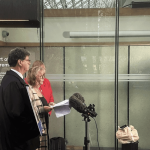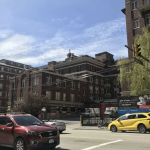VANCOUVER (CCN) — If the Church in North America is a canvas, Barb Dowding is one of the artists helping to paint it, and that includes capturing all its subtleties, from the abstract to the realist.
The special assistant to Archbishop Miller was part of an 18-person synod writing team of individuals appointed by the Canadian and U.S. bishops conferences to work on a “continental synthesis” of the Church in North America, capturing the “resonances, tensions, and themes” taking place among Canadian and American Catholics.
The delegates for North America spent five days in Orlando, Fla., until Feb. 17 and will continue to refine the final Document for North America before submitting it to the Synod Secretariat by March 31. The final documents from all of the continents will then be used to draft the Instrumentum Laboris for the Synod of Bishops for their first session in October and their second in October 2024.

The synod writing team pored over the national syntheses they received from the Canadian and American bishops conferences. Reflecting the views of Catholics of every belief, contentious issues such as women’s ordination were not excluded. The role of the synod writing team was to faithfully capture everything they heard, no matter how contentious.
The potentially issues they received didn’t come as a surprise. “They were all things we’ve heard before,” said Dowding. They also weren’t a large priority. “What we heard mostly was the desire for the Church to find ways to include everyone.”
The goal of the writing team was “to ensure the picture we painted of the Church in North America was clear.”
Having seen what everyday Catholics had to say, Dowding came away with a singular impression: “My personal take is that most of the people who participated in the listening sessions truly love their Church. They want it to be better, to be inclusive, and open to all. But I did not see an overwhelming desire for drastic doctrinal changes.”
She and her fellow writers “talked a great deal about expanding the ‘tent’ and how to move the pegs in a way that makes more room without altering the foundation on which it is built. The image of who is in the tent, and why, was pondered. Is the tent a field hospital? Or is it a club where people are comfortable and staying put?”
Discussion often came down to “radical welcome and what that might look like,” Dowding said.
“Should those people not be going out to share the Good News and evangelize? Or perhaps they need to be waiting and ready to heal the immediate needs of those who need help and be prepared to walk with them so they can be brought inside.”
Canadian members of the North American Writing Team
Bishop Raymond Poisson, CCCB President
Archbishop Richard Gagnon, CCCB Past President
Father Jean Vezina, CCCB General Secretary
Dr. Patrick Fletcher, Ph.D., CCCB Senior Adviser for Theology and Social Doctrine
Father Gilles Routhier, Ph.D. (University of Laval)
Sister Chantal Desmarais, SCSM
Barbara Dowding, Archdiocese of Vancouver (former Chancellor)
Synod Timeline
In August 2022, each episcopal conference in the world submitted a National Synthesis to the Synod Secretariat in Rome. Subsequently, a team selected by the Synod Secretariat reviewed these syntheses and drafted a “Document for the Continental Stage” (DCS), which was released on Oct. 27, officially embarking the universal Church on the Continental Stage of the Synod.
For logistical reasons, the North American meetings of the Continental Stage unfolded online in 12 assemblies from December 2022 to January 2023; two in French, three in Spanish, and seven in English. Each bishop in Canada and the United States was invited to attend, as well as to nominate up to five delegates from his diocese/eparchy.
In each assembly, participants were divided into “listening circles” as they reflected on key questions. Each group then shared the fruits of their discussions in plenary session. On Feb. 1, 2023, a 2.5-hour debrief session was held with the North American Writing Team along with representatives from the 12 online assemblies. Cardinal Mario Cardinal Grech, Secretary General of the Synod of Bishops, was also in attendance.
Along the way, the synodal process has sought to be “a kind of checkup of the health of the People of God scattered all over the world, with its difficulties, its trials, but also with its hopes and joys,” according to one organizer. It seeks, according to Vatican documents, to learn how the process of “journeying together” is happening in local Catholic churches across the world. At the same time, the synod has garnered controversy due, in part, to calls for changes to Church teaching and governance that have emerged during the consultation process.
The synod is now in the midst of its continental phase. Cardinals Mario Grech and Jean Claude Hollerich, who are overseeing the worldwide synod process, say it will be the task of the Continental Assemblies to identify “the priorities, recurring themes, and calls to action” that will be discussed during the first session of the Synod of Bishops Oct. 4-29.
In North America, this phase consisted of a series of 10 virtual meetings of delegates appointed by the bishops of the United States and Canada. (The Catholics and bishops of Latin America, including Mexico, held a separate Latin American and Caribbean Continental Assembly.)
Holding the assemblies virtually, the bishops said, allowed for opportunities for participation in languages other than English. In all, there were five meetings held in English, three in Spanish, and two in French.
The first meeting in English took place on Dec. 14, 2022, and the last one took place Jan. 25. The Spanish and French meetings wrapped up Jan. 18 and Jan. 19, respectively. The assemblies included opportunities for prayer, spiritual reflection, small-group listening circles, and large-group sharing.
The bishops of each of the 192 dioceses in the U.S. and the 72 dioceses in Canada each appointed three to five delegates to represent them at the virtual assemblies. The meetings featured discussions on three reflection questions contained in the synod’s working document, which is filled with direct quotations from the reports sent by bishops’ conferences around the world. The 44-page document, which the Vatican released in late October 2022, summarizes the reports shared with the Vatican by bishops’ conferences, religious congregations, departments of the Roman Curia, lay movements, and other groups and individuals.
That document calls for “a Church capable of radical inclusion” and says that many synod reports raised questions about the inclusion and role of women, young people, the poor, people identifying as LGBTQ, and the divorced and remarried. The document, however, is not “conclusive,” organizers say, but rather is meant to spark dialogue and arouse feedback on what should be the priorities for discussion going forward.
The final, universal phase of the Synod on Synodality will begin with the XVI Ordinary General Assembly of the Synod of Bishops at the Vatican in October, which will be followed by an additional session in October 2024. The feedback from the seven Continental Assemblies on the Document for the Continental Stage (DCS) will be used as the basis for another “instrumentum laboris,” or working document, that will be completed in June to guide the Synod of Bishops’ discussion.
With files from Catholic News Agency, Vatican News, and the CCCB.



